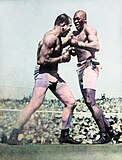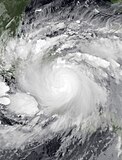Wikipedia:Main Page history/2022 October 17b
From today's featured article

Megalograptus is a genus of eurypterid, an extinct group of aquatic arthropods containing five species, all based on fossil material found in the United States: M. alveolatus, M. ohioensis (pictured), M. shideleri, M. welchi and M. williamsae. They were predators, with the largest and best-known species, M. ohioensis, growing to 78 centimeters (2 ft 7 in). The two most distinctive features of Megalograptus were its massive and spined forward-facing appendages, and its sharp spike-shaped telson (the last division of the body). Attached beneath the non-venomous telson were a pair of rounded blade-formed lobes which made it capable of grasping. Researchers have been able to infer the coloration that specimens might have possessed in life, believed to be brown and black, with M. ohioensis being darker than the others. Megalograptus lived in near-shore marine environments, where it used its large appendages to capture prey. The predator may have been cannibalistic at times, like many modern chelicerates. (Full article...)
Did you know ...
- ... that The New York Times claimed that if Johnson beat Jeffries (fight pictured), black people would "misinterpret his victory as justifying claims to much more than mere physical equality with their white neighbors"?
- ... that the Grade II*–listed Church of St Benedict, in Ardwick, Manchester, is now a climbing centre?
- ... that in 2021 Sarah Aristidou recorded Jörg Widmann's Labyrinth V, a wordless piece for her soprano voice with "ululations, sobs, jazz inflections and wild laughter"?
- ... that Windows 3.1 had a special version, known as Modular Windows, that was controlled via television?
- ... that during the 1960s and 1970s, American artist Robert Bauer painted figures that were a mixture of 20th-century avant-garde funk and 17th-century Dutch realism?
- ... that a Catholic radio station in Texas airs religious talk shows, the Mass—and weekly broadcasts of high school football?
- ... that Jonathan Beaulieu-Richard retired from the Canadian Football League to become a pharmacist?
- ... that in 1979 the magazine Seven Days advised, to avoid ingesting plutonium orally, "never make an A-bomb on an empty stomach"?
In the news
- Hurricane Julia (satellite image shown) leaves more than 80 people dead across South and Central America.
- After an explosion damages the Crimean Bridge, Russia attacks many Ukrainian cities with missiles.
- In motor racing, Max Verstappen wins the Formula One World Championship.
- The Nobel Prize in Chemistry is awarded to Carolyn Bertozzi, Karl Barry Sharpless, and Morten P. Meldal for their work on click chemistry and bioorthogonal chemistry.
On this day
October 17: Shemini Atzeret (Judaism, 2022)
- 1604 – German astronomer Johannes Kepler began observations of an exceptionally bright object, now known as Kepler's Supernova, that had appeared in the constellation Ophiuchus.
- 1777 – American Revolutionary War: British general John Burgoyne's Saratoga campaign ended with his surrender to the Americans, later convincing France to enter the war in alliance with the United States.
- 1814 – A wooden beer-fermenting vat in London burst, destroying a second vat and causing a large flood of at least 128,000 imperial gallons (580,000 l; 154,000 US gal) of porter that killed eight people.
- 1964 – Prime Minister Robert Menzies inaugurated the artificial Lake Burley Griffin (pictured) in the centre of the Australian capital Canberra.
- 1992 – Having gone to the wrong house in Baton Rouge, Louisiana, for a Halloween party, Japanese exchange student Yoshihito Hattori was shot and killed by the homeowner.
- Childe Hassam (b. 1859)
- Herbert Howells (b. 1892)
- Chuka Umunna (b. 1978)
From today's featured list
Today's featured picture

|
The purple roller (Coracias naevius), also known as the rufous-crowned roller, is a medium-sized species of bird in the family Coraciidae widespread in sub-Saharan Africa. Compared with other rollers its colours are rather dull and its voice rather harsh and grating. Its preferred habitat is dry thornveld, where it spends long periods perched at the top of thorn trees or poles, watching for food items such as insects, spiders, scorpions and small lizards on the ground. It rocks to-and-fro about its longitudinal axis during display flights, calling raucously all the while; starting from above the treetops it plummets towards the ground in rolling flight. The species is territorial, and during the breeding season it will drive off other rollers, small hawks, and crows. This purple roller, of the subspecies C. n. mosambicus, was photographed in Etosha National Park, Namibia. Photograph credit: Charles J. Sharp
Recently featured:
|
Other areas of Wikipedia
- Community portal – The central hub for editors, with resources, links, tasks, and announcements.
- Village pump – Forum for discussions about Wikipedia itself, including policies and technical issues.
- Site news – Sources of news about Wikipedia and the broader Wikimedia movement.
- Teahouse – Ask basic questions about using or editing Wikipedia.
- Help desk – Ask questions about using or editing Wikipedia.
- Reference desk – Ask research questions about encyclopedic topics.
- Content portals – A unique way to navigate the encyclopedia.
Wikipedia's sister projects
Wikipedia is written by volunteer editors and hosted by the Wikimedia Foundation, a non-profit organization that also hosts a range of other volunteer projects:
-
Commons
Free media repository -
MediaWiki
Wiki software development -
Meta-Wiki
Wikimedia project coordination -
Wikibooks
Free textbooks and manuals -
Wikidata
Free knowledge base -
Wikinews
Free-content news -
Wikiquote
Collection of quotations -
Wikisource
Free-content library -
Wikispecies
Directory of species -
Wikiversity
Free learning tools -
Wikivoyage
Free travel guide -
Wiktionary
Dictionary and thesaurus
Wikipedia languages
This Wikipedia is written in English. Many other Wikipedias are available; some of the largest are listed below.
-
1,000,000+ articles
-
250,000+ articles
-
50,000+ articles



